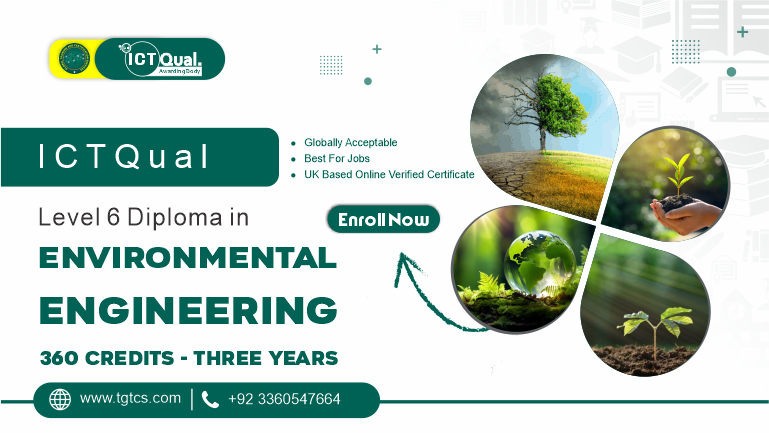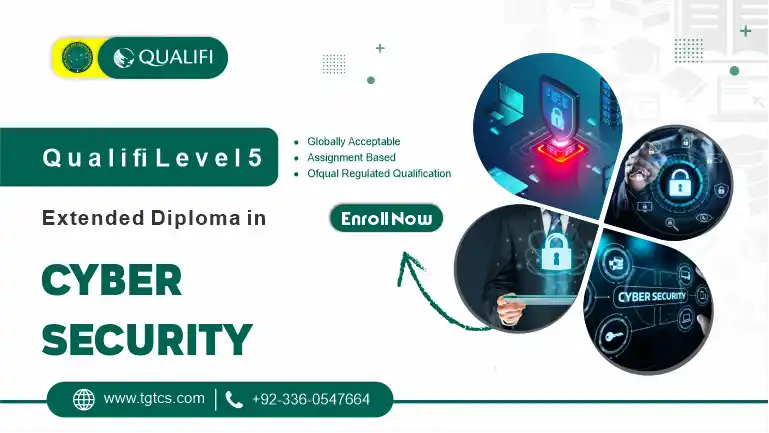ICTQual Level 6 Diploma in Environmental Engineering 360 Credits – Three Years
The ICTQual Level 6 Diploma in Environmental Engineering is a comprehensive three-year program designed for individuals passionate about solving environmental challenges using engineering principles. This course equips students with the technical knowledge, practical skills, and innovative mindset required to excel in the rapidly evolving field of environmental engineering. Whether you’re interested in sustainability, renewable energy, waste management, or climate change solutions, this diploma will provide you with the tools to make a significant impact.
As global environmental concerns intensify, industries are increasingly seeking professionals who can develop sustainable solutions for managing resources, reducing pollution, and tackling climate change. The ICTQual Level 6 Diploma in Environmental Engineering is structured to meet the growing demand for skilled engineers who can innovate and improve environmental systems and technologies.
The ICTQual Level 6 Diploma in Environmental Engineering offers a rewarding pathway to a successful career in an industry that is critical to the future of our planet. By providing a blend of technical expertise, sustainable practices, and real-world applications, this course prepares graduates to lead efforts in environmental protection, resource management, and green innovation.
The Global Training and Certification Services (TGTCS) is Directly Approved Training Centre of ICTQual
The ICTQual Level 6 Diploma in Environmental Engineering (360 Credits – Three Years) is a comprehensive program designed to equip students with the knowledge and skills required to address global environmental challenges. This diploma provides in-depth training in sustainable engineering practices, focusing on areas such as water resource management, renewable energy, waste management, environmental policy, and climate change solutions.
Throughout the course, students will gain hands-on experience in designing and implementing systems that promote environmental sustainability, as well as an understanding of modern technologies and regulations. The curriculum combines core engineering principles with specialized environmental knowledge, preparing graduates to pursue rewarding careers in various sectors, including energy, water management, environmental consultancy, and more.
By completing this diploma, graduates will be well-prepared to tackle pressing environmental issues, develop sustainable solutions, and contribute to a greener future. The program opens doors to numerous career opportunities in both the public and private sectors, making it an ideal choice for individuals passionate about making a positive impact on the planet.
Mandatory Units
The Units of Level 6 Diploma in Environmental Engineering 360 Credits – Three Years are as :
Year 1: Foundations of Environmental Engineering
- Introduction to Environmental Engineering
- Environmental Science Principles
- Basics of Environmental Chemistry
- Introduction to Renewable Energy Systems
- Mathematics for Environmental Engineers
- Engineering Mechanics and Materials
- Introduction to Fluid Mechanics
- Pollution Control and Prevention
- Environmental Regulations and Standards
- Soil Science and Geotechnical Engineering
- Introduction to Sustainable Development
- Communication Skills for Engineers
Year 2: Specialized Environmental Engineering Topics
- Advanced Water Supply and Wastewater Treatment
- Air Pollution Control and Management
- Waste Management and Recycling Techniques
- Hydrology and Water Resources Management
- Advanced Renewable Energy Technologies
- Environmental Impact Assessment (EIA)
- Risk Management in Environmental Engineering
- Environmental Economics and Policy
- Sustainable Infrastructure and Urban Planning
- Climate Change and Environmental Adaptation
- Environmental Data Collection and Analysis
- Environmental Project Management
Year 3: Advanced Studies and Practical Applications
- Sustainable Resource Management
- Advanced Environmental Chemistry
- Energy Efficiency and Green Technologies
- Environmental Monitoring and Data Systems
- Life Cycle Assessment and Eco-Design
- Green Building and Construction Techniques
- Environmental Biotechnology
- Environmental Law and Ethics
- Research Methodology in Environmental Engineering
- Environmental Engineering Design Projects
- Industrial Internship in Environmental Engineering
- Research Project and Dissertation
Learning Outcomes for the Level 6 Diploma in Environmental Engineering (360 Credits – Three Years)
Year 1: Foundations of Environmental Engineering
- Introduction to Environmental Engineering
Grasp the basic concepts and scope of environmental engineering.
Understand the role of environmental engineers in addressing global environmental challenges. - Environmental Science Principles
Demonstrate knowledge of key environmental science concepts and their engineering applications.
Evaluate how human activities impact environmental systems. - Basics of Environmental Chemistry
Understand the chemical processes affecting environmental systems.
Identify pollutants and their effects on air, water, and soil quality. - Introduction to Renewable Energy Systems
Explore renewable energy technologies such as solar, wind, and biomass.
Assess the environmental benefits and challenges of renewable energy sources. - Mathematics for Environmental Engineers
Apply mathematical principles to solve environmental engineering problems.
Develop skills in calculations related to fluid dynamics, pollution control, and energy efficiency. - Engineering Mechanics and Materials
Learn the fundamentals of engineering mechanics in environmental engineering contexts.
Identify materials used in environmental engineering and their properties. - Introduction to Fluid Mechanics
Grasp key concepts of fluid mechanics, including flow, pressure, and velocity.
Apply fluid dynamics principles to environmental engineering challenges, such as water treatment and waste management. - Pollution Control and Prevention
Identify various pollution types and their sources.
Propose engineering solutions for pollution control and prevention. - Environmental Regulations and Standards
Understand national and international environmental laws and regulations.
Assess how these regulations influence environmental engineering practices. - Soil Science and Geotechnical Engineering
Gain insight into soil properties and their importance in environmental engineering.
Analyze soil contamination and remediation methods. - Introduction to Sustainable Development
Define sustainable development and its relevance to environmental engineering.
Identify practices that promote sustainability in engineering projects. - Communication Skills for Engineers
Develop effective communication skills for technical writing, presentations, and team collaboration.
Present complex environmental engineering concepts clearly and effectively.
Year 2: Specialized Environmental Engineering Topics
- Advanced Water Supply and Wastewater Treatment
Understand advanced methods for water purification, treatment, and distribution.
Design and assess wastewater treatment systems focused on sustainability. - Air Pollution Control and Management
Identify sources of air pollution and their environmental impacts.
Develop strategies for air quality monitoring and pollution control. - Waste Management and Recycling Techniques
Evaluate waste management practices and recycling technologies.
Design sustainable waste management solutions for urban and industrial settings. - Hydrology and Water Resources Management
Apply hydrological principles to manage water resources efficiently.
Design systems for water conservation and sustainable usage. - Advanced Renewable Energy Technologies
Analyze emerging renewable energy technologies.
Develop engineering solutions for integrating renewable energy into existing infrastructure. - Environmental Impact Assessment (EIA)
Conduct environmental impact assessments for engineering projects.
Identify potential environmental consequences and propose mitigation strategies. - Risk Management in Environmental Engineering
Apply risk management strategies to minimize environmental risks.
Develop risk assessment models for environmental engineering projects. - Environmental Economics and Policy
Explore the economic aspects of environmental issues and sustainability.
Assess policies and their influence on environmental engineering practices. - Sustainable Infrastructure and Urban Planning
Design and evaluate infrastructure projects with sustainability in mind.
Integrate sustainable urban planning principles into engineering solutions. - Climate Change and Environmental Adaptation
Investigate the impact of climate change on environmental systems.
Develop engineering strategies to adapt to climate change challenges. - Environmental Data Collection and Analysis
Collect and analyze environmental data for decision-making.
Utilize software tools and methodologies to interpret environmental data effectively. - Environmental Project Management
Manage environmental engineering projects from planning to execution.
Develop project management skills, including budgeting, timelines, and team coordination.
Year 3: Advanced Studies and Practical Applications
- Sustainable Resource Management
Understand the principles of sustainable resource use and conservation.
Design systems for efficient management of natural resources. - Advanced Environmental Chemistry
Apply advanced chemical principles to address complex environmental challenges.
Analyze the chemical processes involved in pollutant degradation and treatment. - Energy Efficiency and Green Technologies
Design and implement energy-efficient systems and green technologies.
Analyze how energy efficiency reduces environmental impacts. - Environmental Monitoring and Data Systems
Develop and implement systems for monitoring environmental parameters.
Use advanced technologies for collecting and analyzing environmental data. - Life Cycle Assessment and Eco-Design
Conduct life cycle assessments to evaluate the environmental impacts of products and processes.
Apply eco-design principles to create environmentally friendly systems. - Green Building and Construction Techniques
Understand sustainable construction methods and green building standards.
Design energy-efficient and environmentally sustainable buildings. - Environmental Biotechnology
Explore the role of biotechnology in environmental engineering applications.
Analyze bioremediation and microbial technologies in environmental cleanup. - Environmental Law and Ethics
Understand the legal and ethical aspects of environmental engineering.
Evaluate the role of laws in regulating environmental protection and engineering practices. - Research Methodology in Environmental Engineering
Develop skills in research design and methodology tailored to environmental engineering.
Conduct scientific research on environmental engineering topics. - Environmental Engineering Design Projects
Apply engineering principles to design sustainable environmental systems.
Work on complex projects addressing real-world environmental issues. - Industrial Internship in Environmental Engineering
Gain practical experience through an industrial internship.
Apply theoretical knowledge to real-world environmental engineering tasks. - Research Project and Dissertation
Conduct independent research on a selected environmental engineering topic.
Present findings in a comprehensive dissertation, showcasing critical thinking and research skills.
Course Benefits of the ICTQual Level 6 Diploma in Environmental Engineering (360 Credits – Three Years)
- Comprehensive Knowledge Base
The course provides a deep understanding of environmental engineering principles, from foundational topics such as environmental science and pollution control, to advanced subjects like renewable energy technologies, sustainable infrastructure, and environmental impact assessments. This broad knowledge base equips graduates to address a wide range of environmental challenges. - Industry-Relevant Skills
Through practical application and specialized coursework, students gain hands-on experience in solving real-world environmental issues. The curriculum covers essential topics like water and wastewater treatment, waste management, air pollution control, and climate change adaptation, ensuring graduates are well-prepared for the demands of the industry. - Sustainability Focus
The course emphasizes sustainable development and green technologies, fostering the skills needed to design eco-friendly systems and solutions. Graduates are trained to apply sustainable practices in various sectors of environmental engineering, making them valuable assets to organizations focusing on environmental stewardship and compliance. - Advanced Analytical and Problem-Solving Capabilities
Students learn to analyze environmental data, conduct life cycle assessments, and apply advanced chemical and engineering principles to solve complex environmental challenges. This strong analytical foundation prepares graduates to make data-driven decisions and design efficient systems for resource management and pollution control. - Specialized Areas of Study
The course offers specialized modules on renewable energy systems, environmental economics, environmental law and ethics, and environmental biotechnology, allowing students to develop expertise in key areas that are critical to modern environmental engineering. This specialization enhances career prospects in cutting-edge fields. - Preparation for Leadership Roles
The curriculum includes training in project management, communication, and team collaboration, preparing graduates for leadership roles within the environmental engineering sector. Students gain skills in managing complex engineering projects, including budgeting, timelines, and stakeholder communication, positioning them for managerial positions. - Global Perspective and Impact
Students are exposed to both national and international environmental regulations, allowing them to understand global environmental issues and how engineering solutions can address them. This international outlook enhances graduates’ ability to work in diverse and multi-disciplinary teams across the globe. - Career Advancement Opportunities
The course provides a solid foundation for a wide range of careers in environmental engineering, including roles in water resource management, pollution control, waste management, and renewable energy sectors. Graduates also have the option to pursue further studies or research in environmental engineering. - Hands-on Experience through Industrial Internship
The inclusion of an industrial internship allows students to gain practical, real-world experience in environmental engineering. This invaluable opportunity to apply theoretical knowledge in a professional setting helps students build industry connections and improve their employability upon graduation. - Research and Dissertation Focus
The opportunity to undertake independent research and complete a dissertation enables students to explore specific areas of interest within environmental engineering. This research component helps develop critical thinking, problem-solving, and scientific inquiry skills that are essential for advancing in both professional and academic environments.
By completing the ICTQual Level 6 Diploma in Environmental Engineering, graduates are equipped with the knowledge, skills, and experience needed to excel in the growing field of environmental engineering, contributing to the development of sustainable and environmentally responsible solutions globally.
The ideal learner for the ICTQual Level 6 Diploma in Environmental Engineering is someone who is passionate about environmental protection, sustainability, and the application of engineering solutions to address global environmental challenges. They are motivated to gain a deep understanding of environmental systems and are keen to develop the skills necessary to design, manage, and improve sustainable engineering systems. The following characteristics define the ideal learner:
- Interest in Environmental Issues
The ideal learner has a strong interest in environmental science, sustainability, and the impact of human activities on the natural world. They are driven by a desire to contribute to solving environmental problems such as pollution, resource depletion, and climate change. - Analytical and Problem-Solving Skills
A natural aptitude for critical thinking and problem-solving is important. The learner should enjoy analyzing complex systems, interpreting data, and applying scientific and engineering principles to find innovative solutions to environmental challenges. - Strong Foundation in Science and Mathematics
The ideal learner possesses a solid background in basic science, particularly chemistry, physics, and mathematics. They are comfortable using mathematical tools to solve engineering problems and apply scientific concepts to real-world environmental issues. - Interest in Technology and Engineering Solutions
The learner is excited by technology and engineering innovations, particularly in areas like renewable energy, pollution control, water treatment, and waste management. They are keen to learn how cutting-edge technologies can be integrated into sustainable engineering practices. - Motivated and Self-Driven
This learner is self-motivated, proactive, and able to manage their time effectively. The course is demanding, requiring dedication to both theoretical study and practical application. The ideal student is committed to learning and achieving high standards throughout the three years. - Interest in Sustainable Development
The ideal learner is passionate about sustainable development and eager to contribute to a future where economic growth and environmental protection go hand in hand. They are driven to design and implement systems that reduce environmental impact while promoting social and economic sustainability. - Desire for Practical Experience
This learner values hands-on experience and seeks opportunities to apply theoretical knowledge in real-world scenarios. The industrial internship included in the course is an important aspect, and the learner should be eager to gain practical experience in the field. - Career-Oriented and Ambitious
The ideal learner has a clear vision of their future career and aims to pursue a leadership role in environmental engineering. They are motivated to build a successful career in the growing fields of renewable energy, environmental consulting, or sustainable infrastructure, and recognize the diploma as a pathway to career advancement. - Effective Communicator
While technical knowledge is essential, the ideal learner is also able to communicate complex environmental engineering concepts clearly and effectively. They should possess or be willing to develop strong written and oral communication skills for both technical and non-technical audiences. - Commitment to Lifelong Learning
The ideal learner understands that environmental engineering is a rapidly evolving field, and they are committed to ongoing learning and professional development. They should be open to adapting to new technologies, methodologies, and regulatory changes throughout their career.
Upon successfully completing the ICTQual Level 6 Diploma in Environmental Engineering, graduates have a wide array of career and academic opportunities to further enhance their expertise and professional growth. The skills acquired throughout the program open the door to numerous progression pathways:
1. Career Opportunities
Graduates are well-prepared to embark on diverse career paths in various roles, including:
- Environmental Engineer: Design and implement solutions for environmental challenges such as pollution control, waste management, and water treatment.
- Renewable Energy Specialist: Focus on sustainable energy production systems, including wind, solar, and bioenergy.
- Water Resources Engineer: Manage water supply and wastewater treatment systems, promoting sustainable water use in both urban and industrial contexts.
- Air Quality Specialist: Monitor and address air pollution, designing strategies to improve air quality in different regions.
- Sustainability Consultant: Guide organizations in adopting sustainable practices to reduce their environmental footprint.
- Environmental Compliance Officer: Ensure organizational adherence to environmental laws and regulations, conducting audits and overseeing compliance standards.
- Waste Management Engineer: Design and optimize waste management systems, focusing on recycling, waste reduction, and sustainability in both municipal and industrial sectors.
2. Professional Certifications and Accreditations
Graduates can enhance their professional credentials by pursuing industry certifications and memberships, such as:
- Chartered Environmentalist (CEnv): Work toward earning this prestigious title, which is offered by professional bodies like the Society for the Environment.
- LEED Certification: Obtain a Leadership in Energy and Environmental Design (LEED) certification to specialize in sustainable building design and energy efficiency.
- Project Management Certifications: Gain certifications such as PRINCE2 or PMP to effectively manage large-scale environmental projects.
3. Entrepreneurship
Graduates may choose to establish their own environmental engineering consulting firm or green technology startup. With expertise in areas like waste management, renewable energy, and sustainable development, they can create innovative solutions to environmental challenges while driving business success.
4. Research and Development
For those interested in advancing knowledge in the field, graduates can pursue roles in research and development (R&D), collaborating with government agencies, private sector companies, or academic institutions to develop new technologies and strategies for addressing issues such as climate change, pollution, and resource depletion.
5. International Opportunities
With the growing global demand for sustainability and environmental solutions, graduates can explore career opportunities abroad. Many countries are investing in renewable energy, green technologies, and environmental protection initiatives, creating roles in international organizations, NGOs, and multinational corporations focused on environmental sustainability.
The ICTQual Level 6 Diploma in Environmental Engineering provides a robust foundation for students to either pursue further studies or enter the workforce. Graduates will be well-equipped to contribute to the increasing need for sustainable engineering solutions across a variety of industries and sectors.
Course Overview
Course Level
Level 6
Course Units
36 Mandatory Units
Duration
Three year






